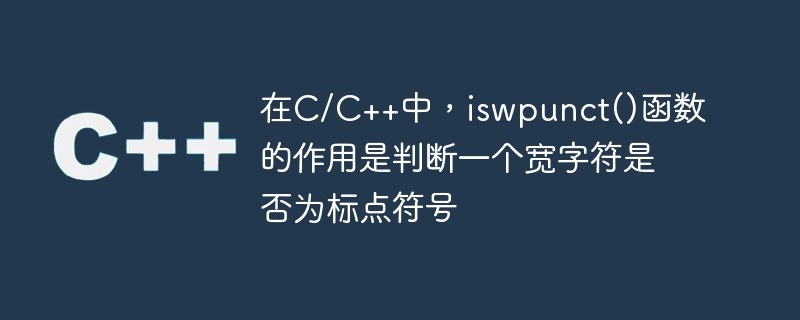

La fonction iswpunct() est utilisée pour vérifier si le caractère large passé est un signe de ponctuation. S'il ne s'agit pas d'un signe de ponctuation, zéro est renvoyé, sinon une valeur non nulle est renvoyée. Il est déclaré dans le fichier d'en-tête "cwctype".
Voici la syntaxe de iswpunct() :
int iswpunct(wint_t character);
Ceci est un exemple de iswpunct()
#include<cwctype>
#include<stdio.h>
using namespace std;
int main() {
wint_t a = '!';
wint_t b = 'a';
if(iswpunct(a))
printf("The character is a punctuation.");
else
printf("\nThe character is not a punctuation.");
if(iswpunct(b))
printf("\nThe character is a punctuation.");
else
printf("\nThe character is not a punctuation.");
return 0;
}The character is a punctuation. The character is not a punctuation.
Dans le programme ci-dessus, deux caractères larges sont déclarés comme a et b. Vérifie si les caractères transmis sont des signes de ponctuation.
wint_t a = '!';
wint_t b = 'a';
if(iswpunct(a))
printf("The character is a punctuation.");
else
printf("\nThe character is not a punctuation.");
if(iswpunct(b))
printf("\nThe character is a punctuation.");
else
printf("\nThe character is not a punctuation.");Ce qui précède est le contenu détaillé de. pour plus d'informations, suivez d'autres articles connexes sur le site Web de PHP en chinois!
 Une fois l'ordinateur allumé, le moniteur n'affiche aucun signal
Une fois l'ordinateur allumé, le moniteur n'affiche aucun signal
 Quels sont les serveurs cloud ?
Quels sont les serveurs cloud ?
 Utilisation de la fonction sprintf en php
Utilisation de la fonction sprintf en php
 Qu'est-ce qu'Avalanche
Qu'est-ce qu'Avalanche
 Comment récupérer les données du disque dur mobile
Comment récupérer les données du disque dur mobile
 Outils d'évaluation des entretiens
Outils d'évaluation des entretiens
 Quelles sont les utilisations de MySQL
Quelles sont les utilisations de MySQL
 Quel logiciel est l'âme ?
Quel logiciel est l'âme ?